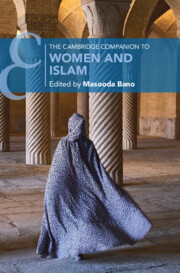Book contents
- The Cambridge Companion to Women and Islam
- Cambridge Companions to Religion
- The Cambridge Companion to Women and Islam
- Copyright page
- Contents
- Contributors
- Preface
- A Note on Foreign-Language Words
- Introduction
- Part I Logic of Classical Reasoning
- Part II Asserting Agency in Faith
- 6 Becoming Salafi
- 7 Joining Political Islam
- 8 Conversions to Islam
- 9 Islamic Feminists’ Approaches
- 10 Women’s Mosques in China
- Part III Asserting Agency in Socio-Political Life
- Volume Bibliography
- Index
- Cambridge Companions To … (continued from page ii)
- References
8 - Conversions to Islam
from Part II - Asserting Agency in Faith
Published online by Cambridge University Press: 12 April 2025
- The Cambridge Companion to Women and Islam
- Cambridge Companions to Religion
- The Cambridge Companion to Women and Islam
- Copyright page
- Contents
- Contributors
- Preface
- A Note on Foreign-Language Words
- Introduction
- Part I Logic of Classical Reasoning
- Part II Asserting Agency in Faith
- 6 Becoming Salafi
- 7 Joining Political Islam
- 8 Conversions to Islam
- 9 Islamic Feminists’ Approaches
- 10 Women’s Mosques in China
- Part III Asserting Agency in Socio-Political Life
- Volume Bibliography
- Index
- Cambridge Companions To … (continued from page ii)
- References
Summary
Vanessa Vroon-Najem reviews the growing scholarship on women’s conversion to Islam in the West. Drawing on years of ethnographic fieldwork with Dutch female converts to Islam, she demonstrates how initial conversions often stem from the appeal of classical Islamic reasoning on gender norms. Over time, these women learn to respect core values while making adjustments on secondary matters, enabling them to engage with a wider society that remains skeptical of their newly acquired Muslim identity.
- Type
- Chapter
- Information
- The Cambridge Companion to Women and Islam , pp. 195 - 213Publisher: Cambridge University PressPrint publication year: 2025

